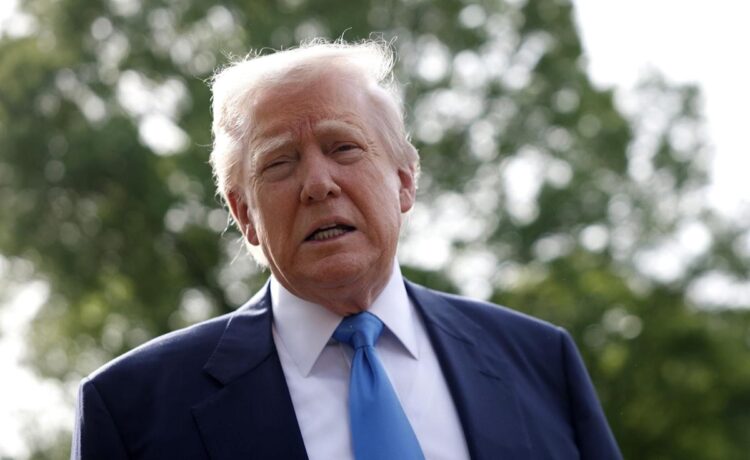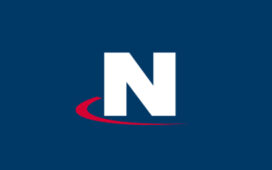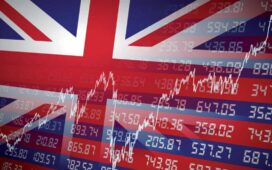Donald Trump has said he cannot rule out insider trading by his staff after his tariff announcements triggered huge stock market swings.
The Trump administration has been hit by a wave of accusations that staffers have been sharing tips on tariff policies and the progress of trade negotiations, allowing traders to get ahead of massive market turbulence.
The President said on Friday: “I can commit to myself, that’s all I can commit to.”
Speaking to reporters on Air Force One, Mr Trump said that although he could not be completely sure about everyone in his administration, he hires “honourable people”.
Mr Trump said: “Thousands of people work for me. But I can’t imagine anybody doing this. I have very honourable people… So I can’t even imagine it.”
Fox Business reported on Thursday that members of White House staff were alerting Wall Street executives that they were nearing an agreement in principle on trade with India.
Earlier in April, a group of senior Democrats wrote a letter to the Securities and Exchange Commission (SEC) calling for an investigation into whether Mr Trump engaged in insider trading while he rowed back on his “reciprocal” tariffs.
In the hour before Mr Trump sent stock markets soaring on April 9 because he scaled back the “reciprocal” tariffs he had imposed on America’s trading partners a week earlier, there was a surge in Nasdaq call volume.
This means traders were racing to buy the right to purchase a share at a certain price.
Read the latest updates below.
08:14 PM BST
Signing off…
That’s all from us on the blog today. You can read The Telegraph’s latest news and analysis here. Have a lovely evening
08:12 PM BST
Pound to soar to ‘highest level since Brexit vote’
Donald Trump’s trade war is set to propel the pound back to levels last seen before the Brexit referendum of 2016, unwinding a decade of losses as the US President’s tariffs undermine the strength of the dollar.
Analysts at Bank of America expect the pound to rise steadily from $1.33 today to $1.43 by the end of 2025 and $1.54 by the end of next year.
A stronger pound on this scale would be expected to reduce inflation in Britain by cutting the cost of imported goods. This includes energy, with critical commodities such as oil traded in US dollars on financial markets.
It could also reduce pressure on borrowers by enabling the Bank of England to cut interest rates further, as officials would no longer need to keep rates high to suppress inflation.
Although the euro has so far been the bigger beneficiary in foreign exchange markets of Mr Trump’s trade war, Athanasios Vamvakidis at the investment bank warns that the EU is more vulnerable than Britain to the rise in tariffs on goods imported by the US.
The euro had also surged on the prospect of more spending by the German Government, but Britain now appears to be better-placed, he said.
“UK data has been improving. The pound has tracked broader FX patterns and a broader market correction will also benefit GBP,” he said.
The fading of “German fiscal euphoria” in markets and the anticipation of closer UK-EU security ties are also likely to boost the pound, Mr Vamvakidis said.
Such a move would represent a remarkable re-setting of prices in currency markets, after the pound plunged in the wake of the decision to leave the EU.
Before Brexit, sterling typically traded at between $1.40 and $1.60, which itself was lower than the pre-financial crisis peak of just over $2.
Since the referendum, it has gyrated mostly between $1.20 and $1.40.
The prospect of a serious rally is also a far cry from the lows of below $1.07, plumbed in the depths of the market crisis which followed Liz Truss’s disastrous mini-budget in 2022.
That crunch raised fears the pound could reach parity – falling so far that £1 would be worth $1.
Instead, Donald Trump’s own self-inflicted economic and market panic has undermined the dollar and so sent the pound upward.
It has led to speculation the US could even lose its status as the world’s reserve currency, and the safe haven for international cash in times of crisis – a position which has given America enormous financial power as well as extra heft in international relations.
07:27 PM BST
US “abuse” of tariffs threatening global financial stability
China’s central bank governor has accused the US of threatening global financial stability through its “recent abuse” of tariffs.
People’s Bank of China Governor Pan Gongsheng said on Friday:
“The recent abuse of tariffs by the United States has severely violated the legitimate rights and interests of other countries, seriously undermined the rules-based multilateral governance system, dealt a heavy blow to the global economic order, and hurt the long-term stability and growth of the global economy.”
Tariffs have triggered “sharp fluctuations in global financial markets” which have threatened global financial stability, he added.
06:45 PM BST
World economy at “pivotal juncture”
Soaring trade tensions mean the world economy is at a “pivotal juncture”, the chair of the International Monetary and Financial Committee (IMFC) has warned.
Mohammed Aljadaan, who is also Saudi Arabia’s finance minister, said on Friday:
“The world economy is at a pivotal juncture. Following several years of rising concerns over trade, trade tensions have abruptly soared, fuelling elevated uncertainty, market volatility, and risks to growth and financial stability.
“Near-term growth is projected to slow, while disinflation is expected to continue but at a slower pace. Intensifying downside risks dominate the outlook, in an already challenging context of weak growth and high public debt.”
06:08 PM BST
FTSE 100 on longest winning streak in eight years
The FTSE 100 index gained 0.09pc on Friday, meaning it has now climbed for 10 trading days in a row.
This the blue-chip index’s longest winning streak in eight years, as investors responded to signals that President Donald Trump is dialling down his trade war with China.
The FTSE 250 rose by 0.5pc, marking its third weekly rise in a row.
05:54 PM BST
“UK-US relationship has delivered prosperity”
Chancellor Rachel Reeves said the UK-US relationship has “delivered prosperity” after her meeting with her US counterpart Scott Bessent.
After talks which the UK government hopes will edge the UK closer to a trade deal, Ms Reeves said on X:
The UK-US relationship has delivered prosperity for businesses and working people on both sides of the Atlantic.
Today I met with @SecScottBessent to discuss the UK-US economic prosperity deal and our goal of reaching an agreement that is in both our national interests.
05:49 PM BST
Dollar on track for worst 100 days of a Presidency
The dollar is on track for its biggest slump during the first 100 days of a US presidency in at least 52 years.
The US dollar index has plunged by nearly 9pc since Donald Trump’s inauguration date on January 20 and April 25, meaning it is on track for the worst loss since at least 1973, according to analysis by Bloomberg.
Normally, the dollar strengthens during the first 100 days of a presidency, with average gains of 0.9pc during each new presidency since 1973, when Richard Nixon took office, and Joe Biden’s term starting in 2021.
05:35 PM BST
Tariff income eases debt ceiling deadline
Higher revenues from tariffs mean Wall Street analysts have pushed back their expectations for when the US government will run out of money under the debt ceiling.
The so-called X-date, when the US government will exhaust its ability to borrow under its debt limit rules, is now expected to hit a couple of months later than previously anticipated.
Bank of America strategists now think the X-date will hit in late October rather than late August, while TD Securities has revised its forecast from early September to late August.
The US debt ceiling is a legal limit on the maximum amount the US Treasury can borrow, which is set at just over $36 trillion.
Federal government borrowing is already at this threshold which means the government is using so-called extraordinary measures to keep going, but the capacity of these accounting gimmicks will soon run out.
04:41 PM BST
European hegemonic ambitions undermined by dire growth
European hegemony remains “a long and hard road away” because the bloc is still grappling with dire growth, according to the IMF.
Some have speculated that American exceptionalism – which has seen it enjoy privileges like a strong currency and low borrowing costs because of its status and the world’s dominant economic and military power – is in question.
However, Alfred Kammer at the Fund said the bloc was unlikely to take America’s place any time soon. He said: “It’s still a long and hard road away, and it starts with utilising the single market in order to … get a dynamic business sector going.”
He highlighted that welfare spending was much higher than in the US, which increased the need to improve living standards and productivity to avoid the bloc sinking deeper into debt.
Mr Kammer said: “That is a must in order to increase growth, and also given all of the spending needs coming to secure the European welfare state.”
04:26 PM BST
Trump’s mooted 25pc tariff on pharmaceuticals could raise US prices by 13pc
A 25pc US tariff on pharmaceutical imports would increase US drug costs by nearly $51bn annually, sending prices in the US soaring by as much as 12.9pc if passed on, writes Max Head.
A report conducted by Ernst & Young found the US imported $203bn in pharmaceutical products in 2023, with 73pc coming from Europe.
Total US sales of finished pharmaceuticals that year amounted to $393bn.
The report, dated April 22 and not made public, was commissioned by the Pharmaceutical Research and Manufacturers of America (PhRMA) whose members include Amgen, Bristol Myers Squibb, Eli Lilly, and Pfizer.
Although some pharmaceutical imports are currently exempted from US tariffs as per the 1995 WTO pharma agreement, Donald Trump has threatened to impose 25pc tariffs on the sector.
The US President ordered the Department of Commerce to conduct an investigation into the industry, including a 21 day consultation, which is seen as the first step to imposing tariffs.
04:12 PM BST
IMF director bangs drum for free trade in tariff rebuke
Governments must do more to help people find jobs and stop workers turning their backs on free trade, according to the IMF.
Alfred Kammer, its European director, insisted the benefits of free trade were clear.
“When you’re looking at the success of technology and of trade in terms of lifting up living standards globally, it is just immense. It’s not just putting people out of poverty. It is helping the rich world also grow richer.”
However, he added that there was “no question” that technological change would leave some people negatively affected.
Mr Kammer said European countries could learn lessons from Denmark, where a “flexicurity” model combines relaxed hiring and firing with a generous social safety net and lots of support to help workers find new jobs.
He said: “It allows workers to move to jobs quickly, including getting the reskilling and upskilling, and I think that needs to be the focus. It’s very clear we need to take care of those who are displaced and who are losing their jobs.”
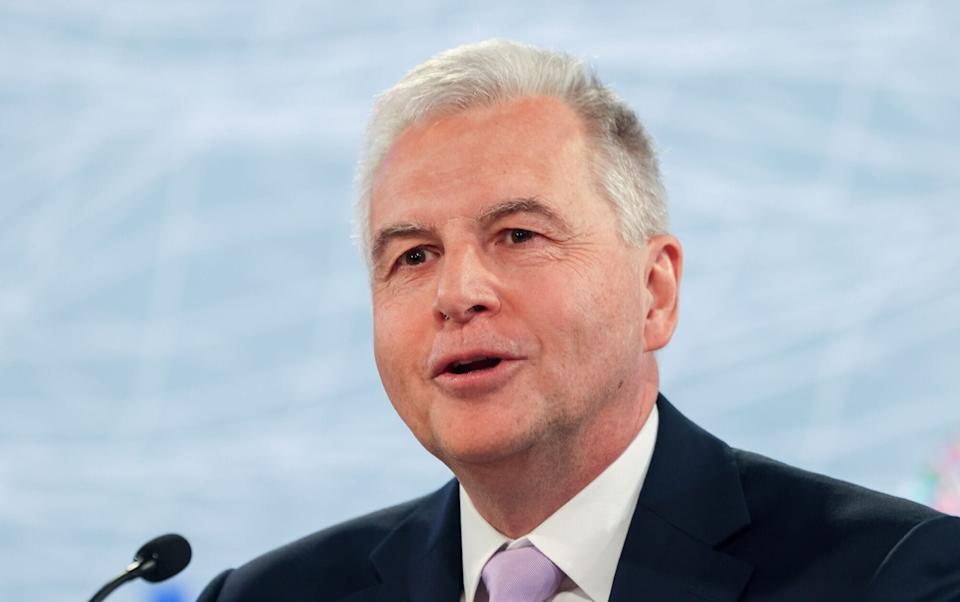
Alfred Kamme at the IMF headquarters in Washington, DC, on Friday – Tierney L. Cross/Bloomberg
04:00 PM BST
Analysis: That sound you can hear from DC? It’s Reeves shooting herself in the foot
Countries are “dying to make a deal” with the US, according to Donald Trump. “I am telling you, these countries are calling us up, kissing my ass,” the president said earlier this month.
Rachel Reeves has opted for a different approach.
Ahead of a meeting on Friday with Scott Bessent, her US counterpart, the Chancellor struck a nonchalant tone when discussing the importance of America to the UK.
03:48 PM BST
Britain should pursue more trade deals, says IMF official
Britain should seek to strike as many trade deals as possible and not pick sides, according to the International Monetary Fund.
Asked if Rachel Reeves should focus on building closer ties with the European Union after the Chancellor suggested a deal with the bloc was “arguably more important”, Helge Berger, European deputy director at the IMF, said: “We agree with everybody who concludes that more trade is better than less trade.
“Trade has been … and will be in the future … an engine for growth and productivity improvements.
“So in that spirit, any trade agreements that the UK will be concluding with any country going forward that will improve the trading relationships that they already have are very welcome, and we would generally encourage all countries to follow this path.”
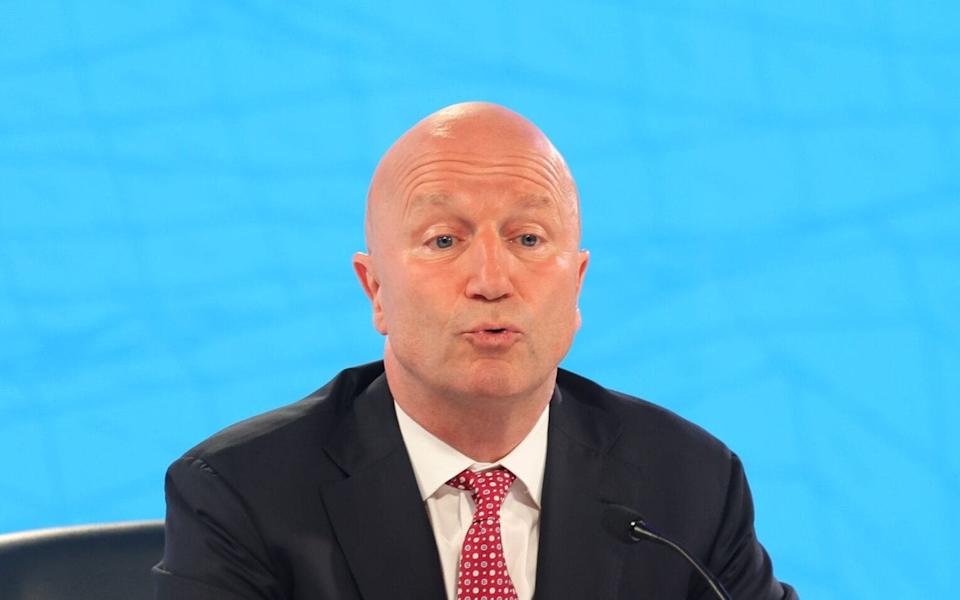
Helge Berger at the IMF headquarters in Washington, DC, on Friday – Tierney L. Cross/Bloomberg
03:31 PM BST
Reeves ‘could cost UK dear’ over EU trade comments, warn Tories
The Conservatives’ shadow business and trade secretary said Rachel Reeves “could cost the UK dear” after she said a trading relationship with the EU is “more important” than with the US.
Andrew Griffith told the Telegraph: “Going to Washington to get a trade deal only to say she views the EU as more important is a major gaffe by this foot-in-mouth Chancellor.
“The US is our single largest trading partner and the one where exporters such as British car markers are facing acute uncertainty right now.
“Once again we see a Chancellor who is out of her depth and making bad choices which could cost the UK dear.”
03:23 PM BST
Trump in favour of banning stock trading by Congress members
Donald Trump said he would “absolutely” sign a bill banning stock trading by members of Congress amid accusations of insider trading during tariff-induced market volatility, writes Julia Amann.
“I watched Nancy Pelosi get rich through insider information,” he told Time when asked if he would implement a ban.
“I would be okay with it. If they send that to me, I would do it.”
Pelosi, who stepped down as speaker of the US House of Representatives in 2023, has previously faced accusations of using information from closed sessions of Congress to make trades in stock markets. She has never faced any charges related to wrongdoing and has denied insider trading.
Earlier this month, senior Democrats in the Senate asked the Securities and Exchange Commission to investigate whether Trump engaged in insider trading and market manipulation.
The Senators wrote in a letter: “It is unclear which officials and affiliates of President Trump had advance knowledge of his plans to delay tariffs – but insiders may have known that he was going to announce a tariff pause and that the market would improve.”
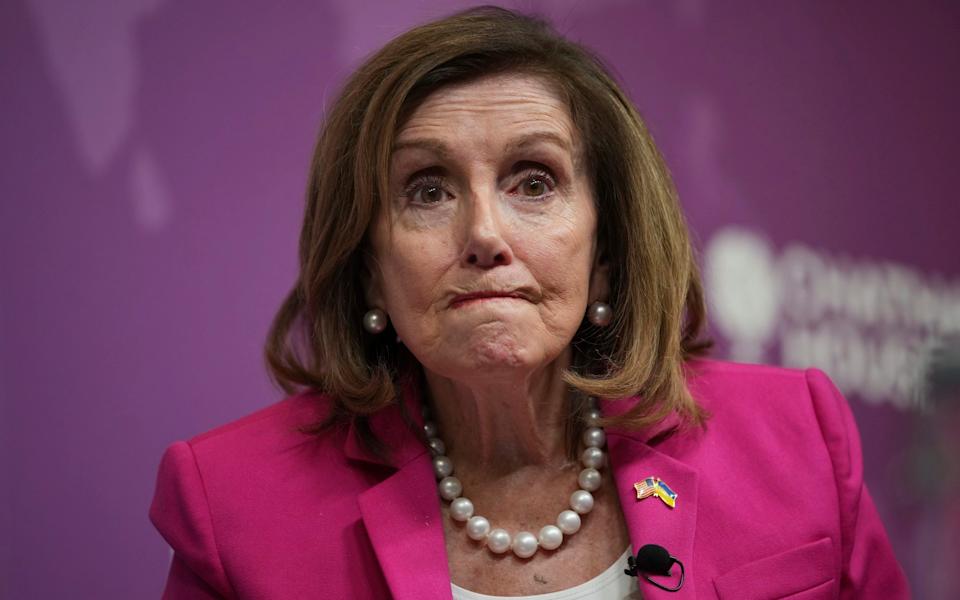
Donald Trump claimed he had seen Nancy Pelosi ‘get rich through insider information’ – AP Photo/Kin Cheung
02:56 PM BST
US ‘very close to deal’ with Japan, says Trump
Donald Trump said the US is “very close to deal” on trade with Japan.
The US president said on the White House lawn that he was “getting along very well with Japan” as he prepared to travel to Rome for the funeral of Pope Francis.
He told reporters: “We’re going to meet with a lot of the foreign leaders. They want to meet.
“Trade deals are going very well.”
The US president said he had spoken with Xi Jinping “numerous times” but refused to elaborate until “the appropriate time”.
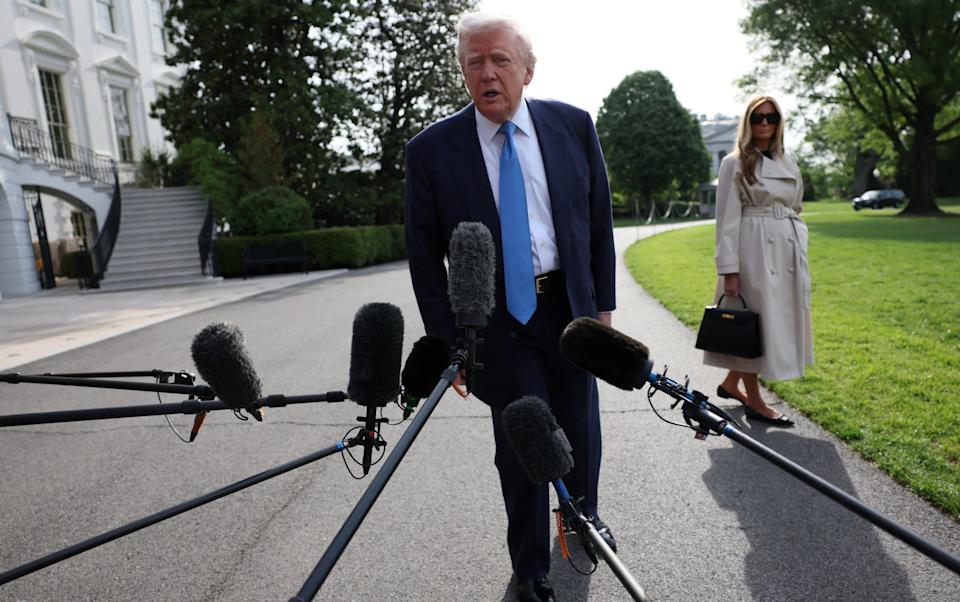
Donald Trump spoke at the White House before he and his wife Melania departed for Rome for the funeral of Pope Francis – REUTERS/Leah Millis
02:48 PM BST
Pound slips ahead of Reeves and Bessent meeting
The value of the pound slipped as Rachel Reeves suggested the EU was a more important trading partner than the US ahead of her meeting with her American counterpart.
Sterling slipped 0.2pc against the dollar to $1.331 despite official retail sales data today which far exceeded expectations.
Sales volumes rose unexpectedly by 0.4pc in March, compared to forecasts for a 0.4pc decline, as good weather boosted footfall.
However, the pound was down ahead of the Chancellor’s meeting later with US treasury secretary Scott Bessent in Washington, where the pair are expected to discuss UK-US trade relations.
The dollar was stronger against most major currencies amid hopes that the US and China could lower tariffs against each other.
The pound was up 0.2pc against the euro, which was worth 85.2p.
02:45 PM BST
Wall Street opens higher on tariff optimism
US stock indexes opened marginally higher as investors expressed caution over optimistic reports of dissipating trade tensions.
The S&P 500 rose 0.1pc, while the Dow Jones fell 0.1pc and the Nasdaq 100 gained 0.2pc.
Joachim Klement, strategist at Panmure Liberum, said investors were holding their breath for the next bout of news on tariffs.
He said: “We are currently in tariff purgatory.
“There is no fundamental change to the outlook, so markets latch on to noise and get constantly whipsawed by the ever-changing utterances of Donald Trump and his cabinet.”
Global stocks nevertheless looked on track to advance for a fourth consecutive day, marking the best winning streak in two months, as tensions cooled between the US and China.
Kok Hoong Wong of Maybank Securities said China’s plan for tariff exemptions on some US imports was a “step toward a de-escalation of the trade war.
He said: “Most of us do not expect US-China to set aside differences in a quick resolution – it would be a long and tumultuous courtship on both sides. But it would appear the worst may truly be over.”
02:30 PM BST
Cooperation with the US is ‘really important’, says Miliband
Ed Miliband has sought to emphasise that cooperation with the US is “really important” and that common ground can be found on topics such as energy.
Speaking at the Summit on the Future of Energy Security in London, Mr Miliband said: “I think our cooperation with the US is really important and despite the differences in perspective I genuinely believe there is common ground to be forged including on energy.”
The secretary of state for energy security and Net Zero’s comments came soon after Rachel Reeves told BBC that trade relations with the EU were “more important” than alignment with the US.
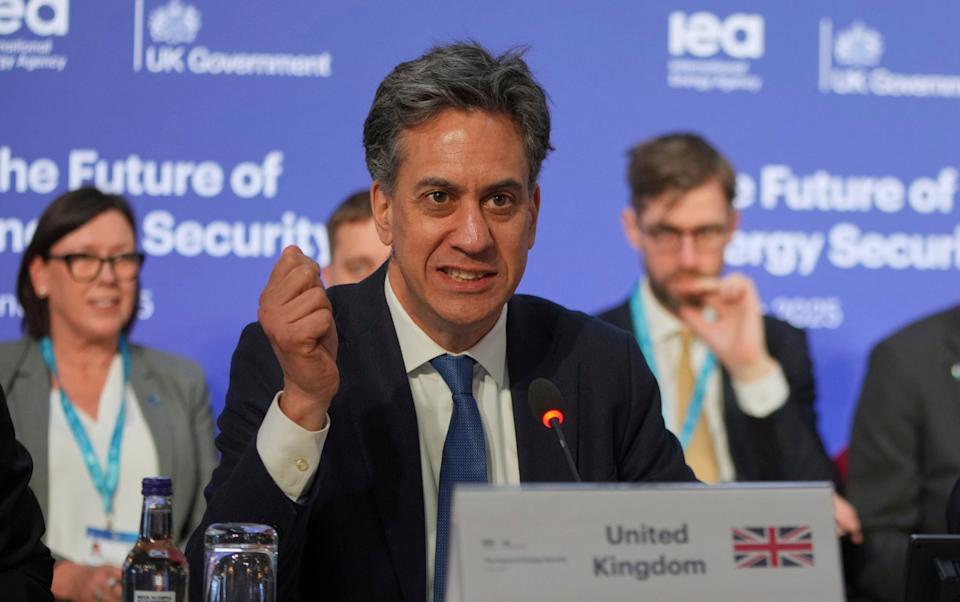
Ed Miliband at the energy summit in Lancaster House, London, on Friday – Kin Cheung/AP
02:29 PM BST
FTSE 100 on track for second week of gains
The FTSE 100 was on track for a second consecutive week of strong gains after Donald Trump rowed back on the most severe of his tariff plans.
The UK’s blue-chip stock index has gained 1.8pc so far this week, although it was a slower pace than the 3.9pc gain that followed the US president’s 90-day suspension of most of his “liberation day” levies.
The FTSE 100 was last up 0.2pc today amid hopes the US and China could announce a scaling back of their tariffs against each other.
Aerospace manufacturer Melrose Industries was the best performer, climbing 2.9pc, with engineering giant Rolls-Royce not far behind, up 2.3pc.
Kathleen Brooks, research director at XTB, saod the performance of the FTSE 100 was “impressive, since it is heavily influenced by energy companies and the price of oil is lower by more than 9pc in the past month”.
Energy heavyweight Shell was up 0.4pc, although BP was flat.
The FTSE 250 was up 0.4pc today and on track for gains of 1.8pc this week.
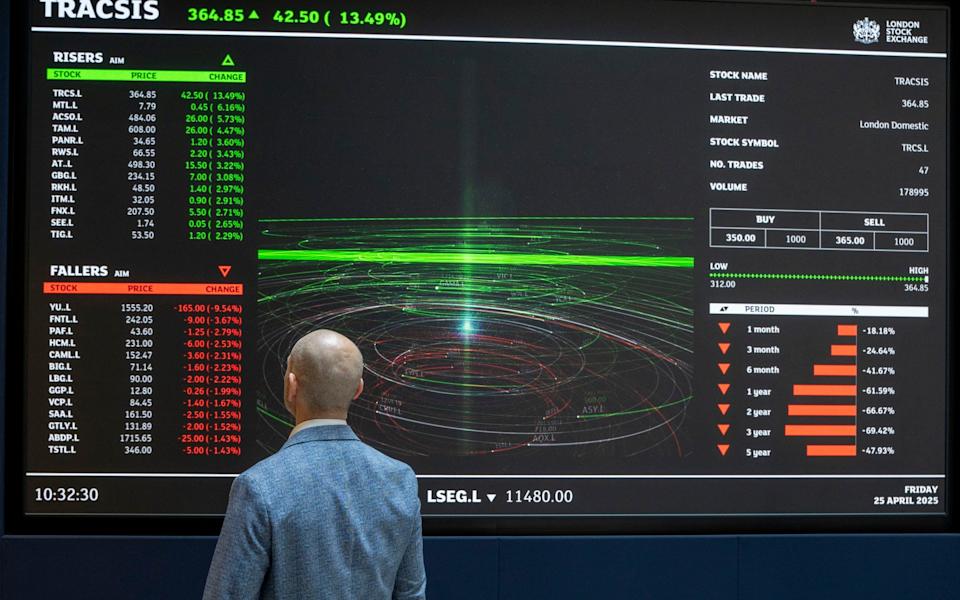
The FTSE 100 on the London Stock Exchange is on track for its second week of gains – Jeff Moore/PA
01:54 PM BST
Tariffs are ‘tremendous success, you just don’t know it yet’, says Trump
Donald Trump has insisted that his trade policy has been a “tremendous success” and any market reaction will steady over time.
In an interview with Time published today, he said: “You see the market fluctuates quite a bit. Today, it’s up 1,000 or 1,200 points.
“It goes up and down, but that will steady out, and we’re taking in tremendous amounts of money.”
He added: “This is a tremendous success. You just don’t know it yet.”
The president denied that pressure from the bond market had convinced him to implement a 90-day pause on reciprocal tariffs.
He said: “The bond market was getting the yips, but I wasn’t. Because I know what we have. I know what we have, but I also know we won’t have it for long if we allowed four more years of the gross incompetence.”
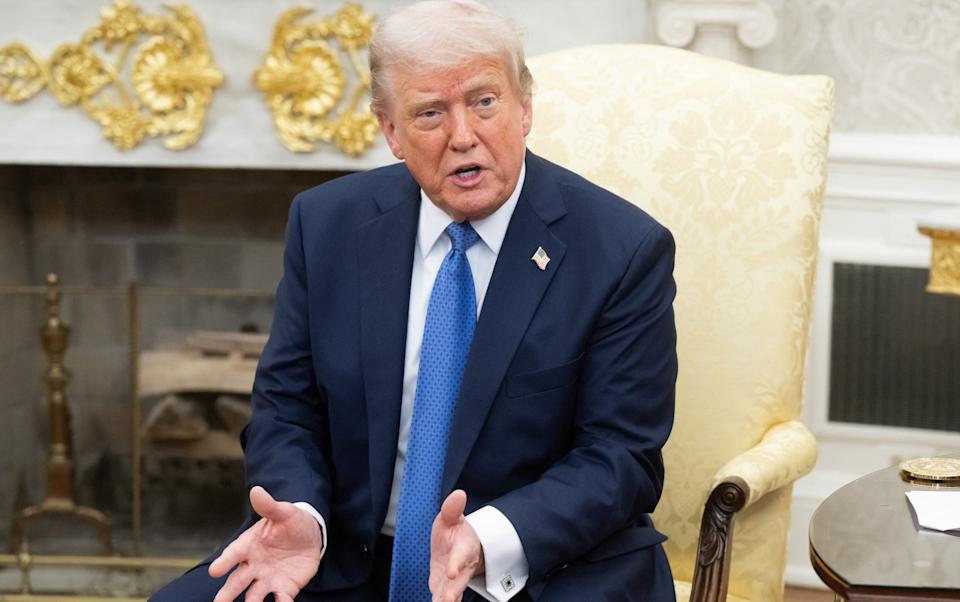
Donald Trump in the Oval Office in Washington, DC, on Thursday – SAUL LOEB/AFP
01:16 PM BST
VAT remains sticking point for Trump
Donald Trump has suggested that value-added tax (VAT) remains a hurdle for trade negotiations with Britain.
In an interview with Time, the US president said the tax, which is levied on goods and services, was being considered in the “price” set on countries.
Critics view Britain’s VAT system as a tariff because it applies to US imports while foreign exporters are refunded the VAT.
The US has no federal VAT and instead relies on a system of state sales taxes which are typically much lower than the UK’s 20pc VAT rate.
Mr Trump said: “The United States was being ripped off by every, almost every country in the world, in the entire world.
“So I will set a price, and when I set the price, and I will set it fairly according to the statistics, and according to everything else.
“For instance, do they have the VAT system in play? Do they charge us tariffs? How much are they charging us? How much have they been charging us? Many, many different factors, right.
“How are we being treated by that country? And then I will set a tariff.”
The president added that paying for a nation’s military would be kept “as a separate item”.
01:01 PM BST
Tariffs could push British restaurants ‘over the edge’
Restaurants and bars experienced a 31pc increase in “critical” financial distress over the last 12 months, the most of any sector, in the wake of domestic tax increases and sweeping US tariffs, writes Julia Amann.
The number of businesses in “critical” financial distress rose 13.1pc in the first quarter of 2025 over last year, according to a report by corporate restructuring firm Begbies Traynor.
Rachel Reeves’ recent tax hikes could exacerbate the hospitality sector’s woes.
April saw a minimum wage hike of 6.7pc, to £12.21, as well as changes to employers’ National Insurance Contributions, which will now be charged at a higher rate and kick in at a lower salary threshold.
Julie Palmer, a partner at the consultancy, said: “Worryingly, the consumer-facing corners of the economy, which have been on the frontline over the last few years, are clearly continuing to struggle.
“These sectors, which are notorious for operating on tight margins, are bracing themselves for further economic fallout from both domestic tax increases and US tariffs which could push many over the edge.”
01:00 PM BST
No 10 refuses to endorse Reeves’s claim on EU trade
Downing Street has refused to endorse Rachel Reeves’s claim that the EU is more important to Britain than the US.
The Chancellor told the BBC this morning: “I understand why there’s so much focus on our trading relationship with the US but actually our trading relationship with Europe is arguably even more important because they are our nearest neighbours and trading partners.”
Asked about the comments, the Prime Minister’s spokesman said it was a “statement of fact” that the EU was Britain’s largest trading partner but declined to repeat Ms Reeves’s claim that this arguably made Brussels more important.
The spokesman said: “As the Prime Minister has said, it’s a false choice to make between the two. Both are of incredible importance to us, and we treat both with enormous respect.”
The timing of the comment is awkward for the Chancellor. Ms Reeves is preparing to meet with US treasury secretary Scott Bessent in Washington today as she attempts to make progress on a potential trade agreement.
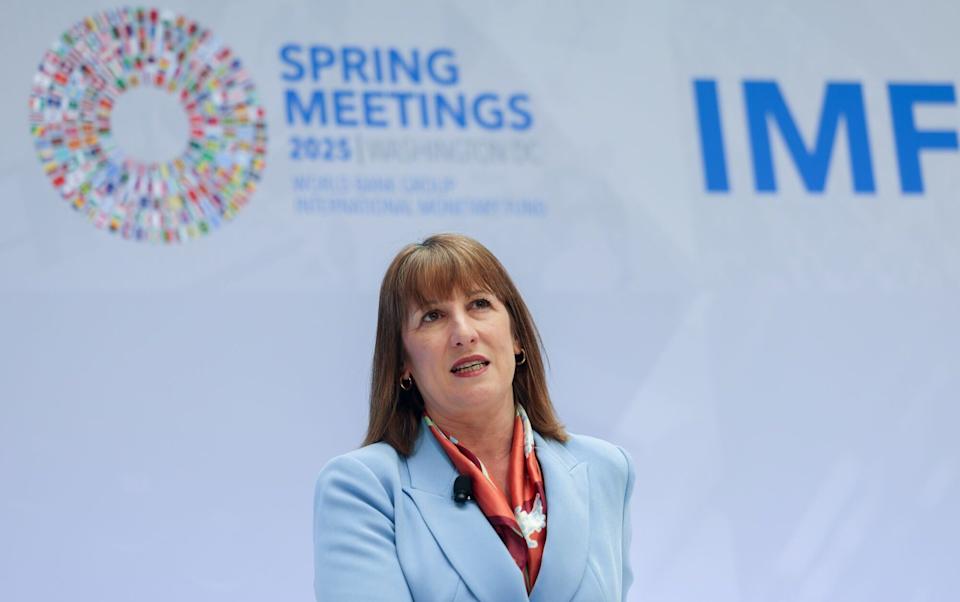
Rachel Reeves at the IMF headquarters in Washington, DC, on 24 April – Tierney L. Cross/Bloomberg
12:45 PM BST
Readers react to Reeves’ EU trade claim
Rachel Reeves may have either scuppered trade talks with the US before they have even started or steered the UK away from seeming “desperate” for a deal, according to Telegraph readers.
Here is a selection of views from the comment section below. You can join the debate here:
12:31 PM BST
UK stocks waver as market caution cools
The FTSE 100 was marginally up on cautious optimism around a rollback of trade tensions, writes Max Head.
The UK’s flagship index rose 0.1pc, extending its winning streak to ten consecutive sessions and securing its second straight week of gains.
Aerospace and defence stocks drove the uptick, with Melrose rising as much as 4.3pc after a share buyback and Babcock climbing 4.3pc on the back of forecasting profits above market estimates.
Rolls Royce rose as much as 2.8pc to reach heights not seen since Donald Trump’s tariffs spooked global markets.
Alphabet, which owns Google, posted strong earnings which lifted tech investors Perishing Square and Polar Capital, who were up 1.8pc and 2.1pc respectively.
Gold producer Endeavour dropped 2.3pc, as the precious metal’s price continued to tumble, while Rightmove and Unilever were both down in response to weak consumer confidence data.
12:11 PM BST
Xi has called me, claims Trump
Donald Trump has said his administration has been meeting with Chinese delegates and that Xi Jinping has called him, despite China stating it is not engaged in tariff talks with the US.
The US president told Time magazine: “He’s called. And I don’t think that’s a sign of weakness on his behalf.”
Mr Trump claimed to have “made 200 deals” so far, which would become apparent in the next three to four weeks.
“You have to understand, I’m dealing with all the companies, very friendly countries,” he said, adding: “We’re meeting with China. We’re doing fine with everybody. But ultimately, I’ve made all the deals.”
The US president said it would be “total victory” if tariffs of 20pc or higher remained a year from now as “the country will be making a fortune”.
He said: “Look, that’s what China did to us. They charge us 100pc. If you look at India – India charges 100-150pc.
“If you look at Brazil, if you look at many, many countries, they charge – that’s how they survive. That’s how they got rich.
“We were carrying other countries on our back with, you know, with trade numbers, with horrible numbers, and we’ve changed it.”
11:37 AM BST
US conducting ‘privileged’ negotiations with 15 countries, says Swiss leader
Switzerland is amongst 15 countries with which the US is conducting “privileged” trade negotiations, Swiss president Karin Keller-Sutter said following bilateral meetings between the countries, writes Julia Amann.
Ms Keller-Sutter, who also serves as Swiss finance minister, said she was “satisfied” with talks in Washington this week that included a meeting with US Treasury Secretary Scott Bessent.
“The United States has defined a group of 15 countries with which it wants to find … a quick solution in this tariff question. Switzerland is part of this group of these 15 countries,” she said.
It was not clear which other countries would be included, but Ms Keller-Sutter said: “The US envisages conducting, I would say somewhat privileged negotiations and finding solutions” with that group.
The US has been Switzerland’s most important goods export market worldwide since 2021. The bilateral trade volume in goods and services between Switzerland and the U.S. reached a total of $185.9bn in 2023.
“The US authorities have clearly expressed their desire to find a solution with Switzerland,” Ms Keller-Sutter said.
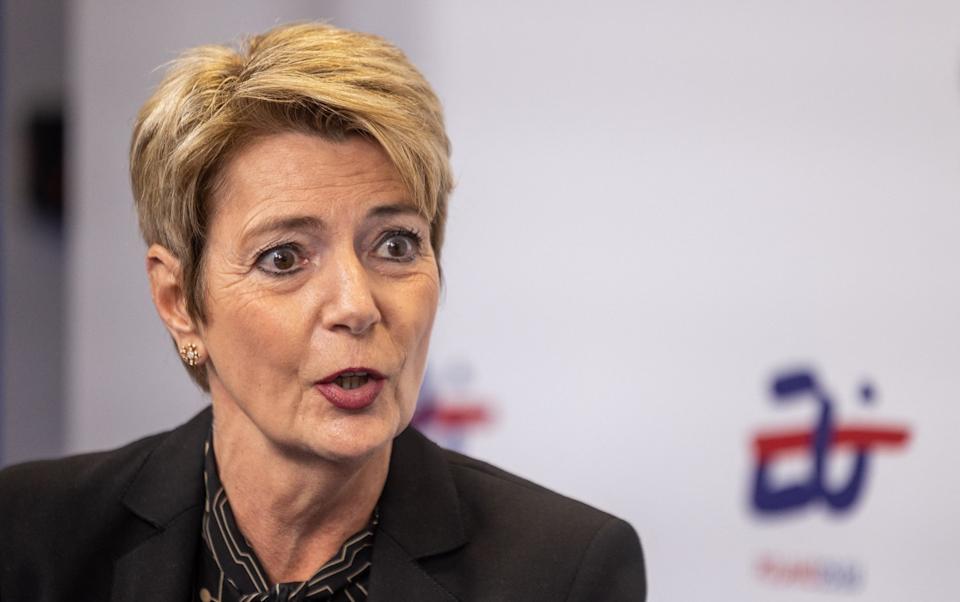
Karin Keller-Sutter at a meeting of EU ministers and central bank governors held in Warsaw, Poland, earlier this month – WOJTEK RADWANSKI/AFP
11:18 AM BST
EU demands UK pay to access defence fund
Brussels will demand the UK pay a fee to ensure British companies have access to a €150bn defence fund.
The UK is poised to sign a defence and security pact with the EU at a summit on 19 May, but a further agreement will be needed for firms such as BAE Systems to access contracts funded by the Security Action For Europe (Safe) fund, according to the Financial Times.
An EU diplomat told the newspaper: “The pact is a non-binding instrument. The more difficult hurdle is going to be a bilateral agreement that would include a financial contribution.”
Brussels’ warning comes soon after Rachel Reeves touted trade relations with the EU as being more important than Britain’s trading relationship with the US.
The Safe fund, set up by the European Commission, will issue cheap loans to EU governments for the purpose of buying weapons.
Thomas Regnier, the commission’s defence spokesperson, told the Financial Times that third countries must “negotiate specific, mutually beneficial agreements on the participation of their respective industries in procurements”.
Another EU diplomat told the newspaper: “Of course, the French will try to complicate it for the Brits.
“I imagine that there will be some form of [financial] contribution involved.”

Sir Keir Starmer and defence secretary John Healy talk with naval officers on the HMS Prince Of Wales on April 24 – RICHARD POHLE/Pool via REUTERS
10:44 AM BST
Apple pivots away from China with aim to source all US phones from India
Apple is preparing to shift all US iPhone production to India by the end of next year as Donald Trump’s tariffs force technology companies to split with China.
The $3 trillion technology giant has long manufactured tens of millions of iPhones each year in Zhengzhou, known as “iPhone City”, in mainland China. But Mr Trump’s trade war has forced it to speed up plans to reduce its reliance on the country.
Apple plans to source the roughly 60m iPhones it sells in the US each year exclusively from India by the end of 2026, the Financial Times reported, doubling its production there.
The technology giant has historically relied on Foxconn, a Taiwanese company, which manufactures its iPhones in China, although it had already started building capacity in India.
Mr Trump’s tariff spree wiped a fifth from Apple’s market valuation in the space of the week after he revealed his trade war plans on “Liberation Day” earlier this month.
Its stock has since recovered amid hopes that Mr Trump plans to negotiate with China and end the tariff turmoil.
Mr Trump has slapped import duties of 145pc on most goods from China. Although smartphones are exempted from this higher fee, they still face a 20pc tariff that is levied on all Chinese goods.
The Republican has insisted he wants to see iPhones made in America, and Apple has announced plans for $500bn in domestic investment. However, analysts believe iPhones made in the US would cost hundreds of dollars more than those made overseas.
India faces the prospect of 26pc “reciprocal” tariffs, although these have currently been frozen. JD Vance, the Vice President, has spoken of “very good progress” on trade talks between the US and India in the last week.
Prachir Singh, an analyst at Counterpoint Research based in India, said: “Made in India iPhones accounted for 18pc of global shipments in 2024 and could reach 25-30pc this year.
“India has the potential to meet US demand; the real test will be how fast and efficiently it can scale.”
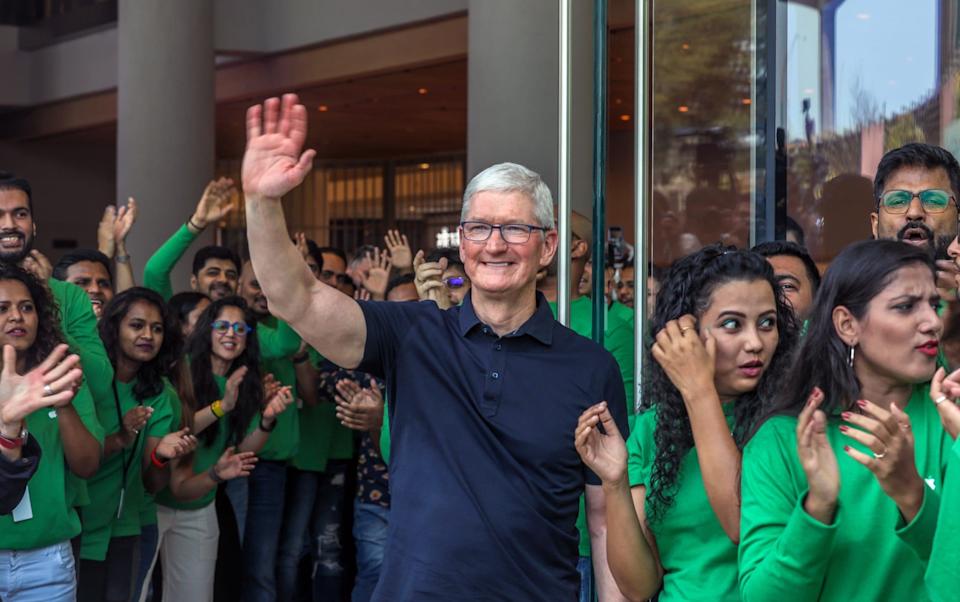
Apple CEO Tim Cook opening the first Apple store in Mumbai, India, in 2023 – DIVYAKANT SOLANKI/EPA-EFE/Shutterstock
10:32 AM BST
China grants tariff exemptions to some US pharmaceuticals
The president of the American Chamber of Commerce in China said companies in the pharmaceutical sector had reported being granted tariff exemptions in the past week.
Michael Hart said he believed China’s climbdown was drug-specific, not industry wide, and forms part of a wider rapprochement.
Companies in sectors including aviation and industrial chemicals have also reported being granted a reprieve, while Chinese local media said some semiconductors had also been waved through.
Mr Hart said: “It’s good to see that both sides are reviewing the tariffs and it looks like they’re starting to produce lists of exclusions for specific categories.
“Our member companies have reported that even within the last week, they had a few shipments that were imported that did not have tariffs levied on them.
“So I think for the critical sectors, we may be able to assume that that’s already in place, but I don’t think it’s a specific policy. I think right now it’s more of a one-off.”
Pharmaceutical companies including AstraZeneca and GSK operate at least one manufacturing site in the US for drugs sold in China, according to Chinese government data.
10:23 AM BST
Have your say
Rachel Reeves has said Britain’s trading relationship with the US is less important than its alignment with the EU as she prepares to meet the US treasury secretary Scott Bessent today.
The chancellor’s strategy of simultaneously wooing Europe and the US has drawn concern that the UK will eventually be forced to choose one bloc or another, particularly in the face of Donald Trump’s tariff onslaught.
10:01 AM BST
Indonesia seeking ‘fair and square’ trade with US
Indonesia has said it is seeking a “fair and square” trade relationship with the US during ongoing negotiations over tariffs.
Airlangga Hartarto, head of the negotiating delegation, and Sri Mulyani Indrawati, the finance minister, have been in the US since last week negotiating the proposed 32pc tariffs on Indonesia.
These tariffs have been put on hold for 90 days.
Mr Hartarto told a press conference: “In the negotiation process, Indonesia prioritises national interests while encouraging the strengthening of bilateral relations with US.”
Last year, Indonesia reported a $14.3bn trade surplus with the US but has since proposed increasing its imports by up to $19bn by switching to US suppliers for goods such as wheat, soybean, liquefied petroleum gas and crude.
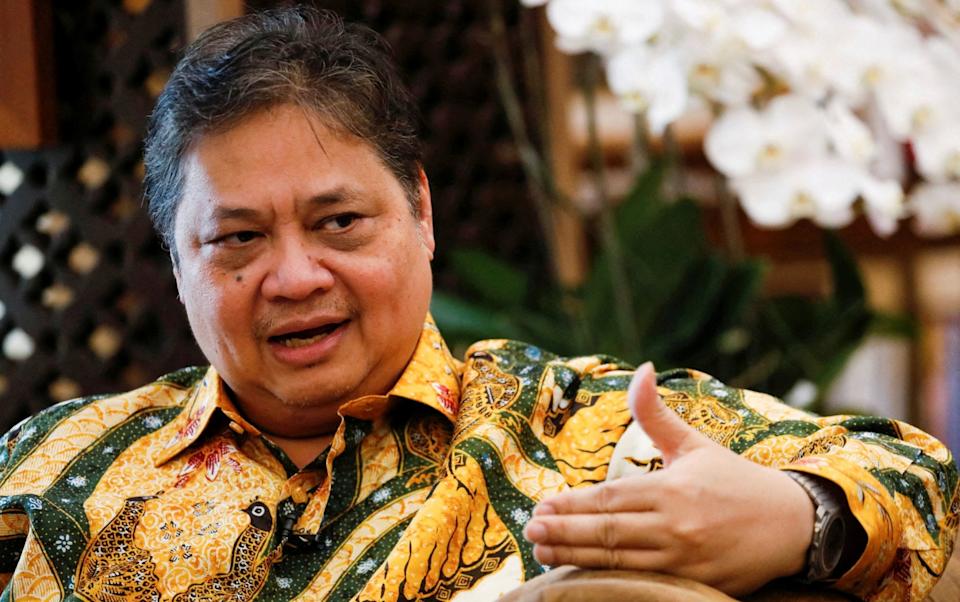
Airlangga Hartarto at his office in Jakarta, Indonesia in 2023 – REUTERS/Ajeng Dinar Ulfiana
09:30 AM BST
China to exempt aircraft parts, says jet engine maker
China has decided to grant exemptions from import tariffs for some aircraft parts, including jet engines, a French aircraft equipment maker has said.
Olivier Andries, chief executive of Safran, said aircraft parts would not be taxed in the latest sign that the superpowers are prepared to step back frmo the brink.
Speaking on a first-quarter earnings call on Friday, he said: “We learned last night that China has taken the decision not to tax engines or landing gear or nacelles (engine housings), in other words a certain number of aerospace equipment parts.
“It demonstrates that the situation is very fluid.”
He added that finished aircraft had not been included in the decision.
China is reportedly considering exempting a host of US imports such as vaccines to chemicals from its 125pc tariffs.
Safran, which has factories in France and the US, co-produces LEAP jet engines for Boeing and Airbus narrow-body jets as well as China’s COMAC C919 jetliner.
Boeing has repatriated some undelivered jets and threatened to sell jets locked out of China to other airlines.
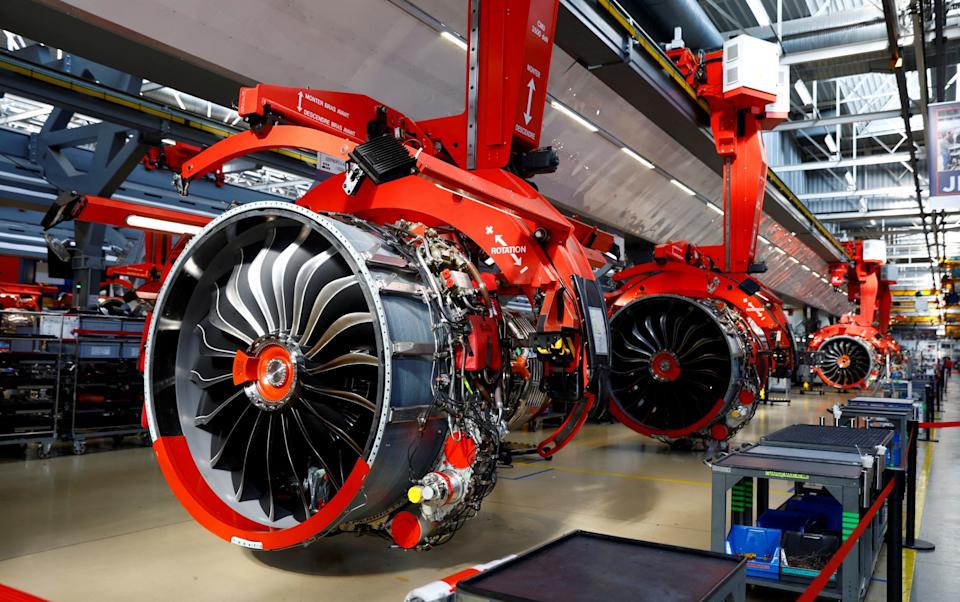
LEAP-1A engines at Safran’s factory in Villaroche, near Paris – Gonzalo Fuentes/REUTERS
09:16 AM BST
Gold dips as investor hopes rise
Gold has dropped again after recording record highs earlier on in the week, as investors spied easing of trade tensions on the horizon.
The safe haven asset shed as much as 1.9pc, declining for the third time in four sessions and wiping out its weekly gain.
Yuxuan Tang at JPMorgan Private Bank said the Trump administration’s mooting of an imminent trade deal with South Korea and China’s consideration of suspending its tariff on some US imports had reassured some investors.
She said: “Headlines over potential, partial exemptions in retaliatory tariffs further boosted sentiment today and allowed gold to dip below $3,300 levels.”
Gold for immediate delivery was trading 1.3pc lower at $3,306.22 an ounce in Singapore at 8am GMT, down from its peak above $3,500 earlier in the week.
The previous metal remains more than a quarter higher this year as the Trump administration’s trade policy spooked markets.
08:37 AM BST
European shares rise amid hopes of US-China de-escalation
European shares rose amid hopes for a de-escalation in the US-China trade war.
China is considering exempting some U.S. imports from its 125pc tariffs, according to Reuters, stoking hopes for a calming of the spiralling trade war between the world’s two largest economies.
Germany’s Dax rose 0.1pc, France’s Cac 40 gained 0.5pc and Spain’s Ibex lifted 0.8pc, although Britain’s FTSE 100 reversed earlier gains to trade flat.
European travel stocks rose by as much as 2pc, followed by cars and parts makers, were up as much as 1.7pc.
08:26 AM BST
China foreign ministry ‘not familiar’ with talks of US tariff exemptions
A spokesperson for China’s foreign ministry said he was not familiar with the specifics of whether China was planning tariff exemptions on some US imports.
Guo Jiakun reiterated in a regular press briefing that China and the United States were not having any consultations or negotiations on tariffs.
“The United States and China are not engaged in consultations or talks on the tariff issue,” he said, before urging Washington to stop “misleading the public”.
08:12 AM BST
Retail sales rise at fastest pace since pandemic
British stocks were lifted not just by hopes of a US trade deal but also by the biggest increase in retail sales in nearly four years.
Sales volumes unexpectedly rose last month as warmer weather boosted sales for fashion chains and garden centres, according to new official data.
The overall quantity of sales increased by 0.4pc in March, following a rise of 0.7pc in February, the Office for National Statistics (ONS) said.
Most analysts had been expecting sales to decline by 0.4pc last month.
Between January and March, the volume of sales rose by 1.6pc compared with the previous quarter, which was the fastest pace since the spring of 2021, the ONS said.
Hannah Finselbach, ONS senior statistician, said: “The good weather helped to boost sales across a variety of sectors.
“Garden centres reported robust trading and the sunny weather also helped brighten sales of DIY goods and clothing.
“Food sales, particularly within supermarkets, again had a poor month.
“The bigger picture shows retail sales are up across the quarterly and annual period, but are still a little below pre-pandemic levels.”
08:04 AM BST
UK markets edge higher amid hopes for tariff deals
The FTSE 100 edged higher at the start of trading amid hopes the US and China may scale back their trade war.
The UK’s flagship stock index rose 0.2pc to 8,425.39 while the mid-cap FTSE 250 gained 0.7pc to 19,617.59.
07:59 AM BST
Britain ‘not the cause’ of problems on trade, says Reeves ahead of US talks
Rachel Reeves said Britain is “not the cause” of the problems that Donald Trump is trying to address with tariffs, as she prepares to meet the US treasury secretary later today to potentially discuss a UK-US trade deal.
The Government hopes that a trade deal with the US will mitigate the impact of the tariffs imposed by President Trump at the start of April that rocked financial markets and sparked fears of a global downturn.
Mr Trump’s announcement saw Britain hit with 10pc tariffs on all exports to the US, as well as a 25pc levy on cars, steel and aluminium.
The Chancellor told the BBC she “understands what president Trump wants to address” when speaking about tariffs.
She said: “I understand why President Trump wants to address some of the global imbalances there are in the system – some countries running very large and persistent trade surpluses.
“Britain is not the cause of those problems. With the US we have balanced trade – neither a surplus nor a deficit – and that’s why I think there is a deal there to be done with the US.
“But I think it is important that we understand why the US are doing what they’re doing. They were elected on a change mandate last year, the UK Labour government was elected on a change mandate last year.
“In both of our countries many working people felt that the economy was not working for them and both of our governments in our own ways are trying to address that.”
07:51 AM BST
Reeves says EU trade more important than US
Rachel Reeves said Britain’s trading relationship with the EU is more important than its alignment with the US as she prepares to meet Scott Bessent in Washington.
The Chancellor will meet the US treasury secretary today as she attempts to make progress on a trade deal following a series of talks with other finance ministers at the International Monetary Fund’s spring meetings earlier this week.
Ms Reeves said she understood why Donald Trump is trying to address “global imbalances” in trade.
However, she told the BBC: “I understand why there’s so much focus on our trading relationship with the US but actually our trading relationship with Europe is arguably even more important because they are our nearest neighbours and trading partners.”
It comes after the Chancellor accused China of manipulating its economy and building up “persistent trade surpluses” that are distorting global trade.
In her some of her strongest criticism of Beijing to date, Ms Reeves said China’s rise had also posed “many challenges” for other economies.
Addressing an audience of diplomats and bankers at the British Embassy in Washington, Ms Reeves said: “One way in which the world has changed has been the rise in the last 25 years of China as an economy.
“And that has created huge benefits in terms of cheaper goods, more innovation and more opportunities to trade. But it has also brought many challenges.”
07:34 AM BST
China urge countries to oppose ‘unilateral bullying’
China’s top leaders said they wanted to work with the international community to oppose “unilateral bullying” in global trade, according to state news agency Xinhua.
The ruling Communist Party’s top decision-making body said in the gathering attended by President Xi Jinping that they should “work with the international community to actively uphold multilateralism and oppose unilateral bullying practices”.
According to a readout of the meeting, China’s leaders think a boost in consumer spending is needed to kickstart the economy.
They said China should “vigorously develop service consumption and enhance the role of consumption in stimulating economic growth”.
07:24 AM BST
Reeves accuses China of manipulating its economy
Rachel Reeves has accused China of manipulating its economy and building up “persistent trade surpluses” that are distorting global trade.
While the Chancellor stopped short of directly accusing Beijing of cheating, she warned that two decades of cheap Chinese exports had not always been underpinned by transparent policies.
In her some of her strongest criticism of Beijing to date, Ms Reeves said China’s rise had also posed “many challenges” for other economies.
Addressing an audience of diplomats and bankers at the British Embassy in Washington, Ms Reeves said: “One way in which the world has changed has been the rise in the last 25 years of China as an economy.
“And that has created huge benefits in terms of cheaper goods, more innovation and more opportunities to trade. But it has also brought many challenges.”
Ms Reeves added that the challenges that Donald Trump’s administration has spoken about such as global trade imbalances were “very real, and we should address them, because it’s not right that some countries run large persistent trade surpluses and others large persistent trade deficits, especially when those surpluses aren’t always because of transparent policies.”
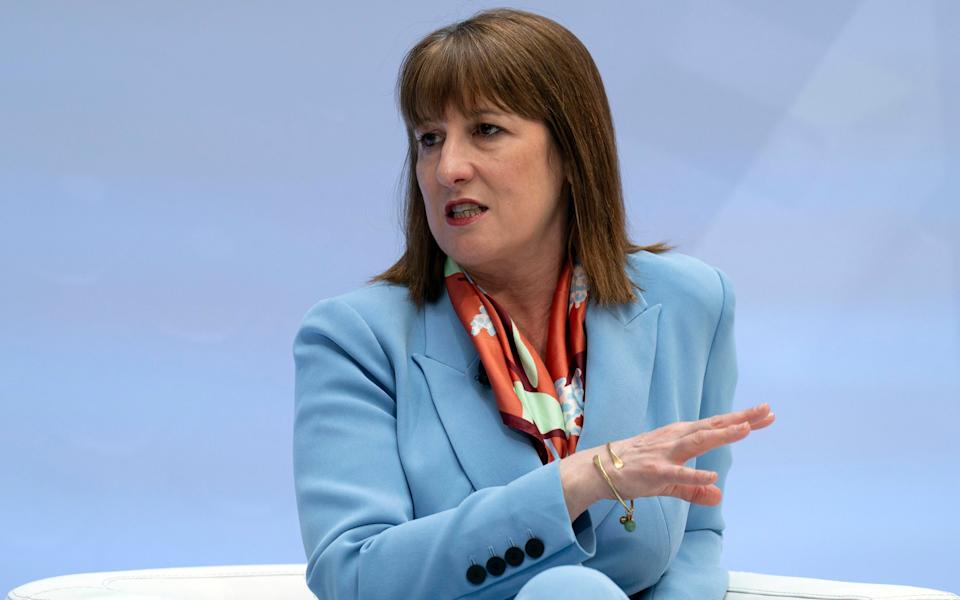
Rachel Reeves spoke during a panel debate at the World Bank/IMF Spring Meeting in Washington on Thursday – AP Photo/Jose Luis Magana
07:20 AM BST
Stocks jump as China ‘considers US tariff exemptions’
Stock markets jumped after it was said China is considering exempting some US goods from its 125pc tariffs.
The Nikkei in Japan rose 1.8pc and the Hang Seng in Hong Kong was up 1.1pc after reports a Ministry of Commerce taskforce is collecting lists of items that could be exempted from tariffs.
European stocks were higher in premarket trading after Reuters reported China is asking companies to submit their own requests for items to be spared duties.
American Chamber of Commerce in China president Michael Hart said: “The Chinese government, for example, has been asking our companies what sort of things are you importing to China from the US that you cannot find anywhere else and so would shut down your supply chain.”
A list of 131 categories of products eligible for exemptions was circulating widely on social media and among businesses and trade groups on Friday.
Stocks were already on track for a second week of gains after Donald Trump signalled he could reduce tariffs against China.
Meanwhile the White House hinted that its first trade deal could be with South Korea, saying that the talks are progressing faster than it expected.
07:12 AM BST
Good morning
Thanks for joining me. Stock markets were climbing after it was said that China is considering some exemptions to its 125pc tariffs on US goods.
Asian markets rose and Europe was on track to make gains at the open after Reuters reported a Ministry of Commerce taskforce was collecting lists of items that could have duties removed.
5 things to start your day
What happened overnight
Asian stock markets headed for a second straight week of gains as investors focused on signs the US and China were prepared to pull back from their trade war.
Tech stocks were lifted after Google parent Alphabet also beat profit expectations and reaffirmed AI spending targets, pushing its shares up nearly 5pc in after-hours trade in New York.
The dollar, which has taken a beating through a volatile few weeks of tariff announcements found a footing around $1.328 to the pound and $1.133 per euro.
In Hong Kong, the Hang Seng rose 1pc and there were small rises for mainland China’s Shanghai Composite and blue chip CSI300.
In Japan, the Nikkei was up 1.8pc and has regained all its losses since Trump’s announcement of the highest US tariffs in 100 years.
On Wall Street, major stock indexes rose yesterday. The Dow Jones Industrial Average rose 1.2pc, to 40,093.40, the S&P 500 rose 2pc, to 5,484.77 and the Nasdaq Composite rose 2.7pc, to 17,166.04.
In the bond market, the yield on 10-year US Treasury notes fell to 4.325pc from 4.362pc late on Wednesday.

